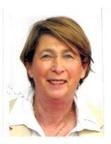Dorothea Shefer-Vanson's Blog, page 7
May 27, 2024
Mozart; The Reign of Love
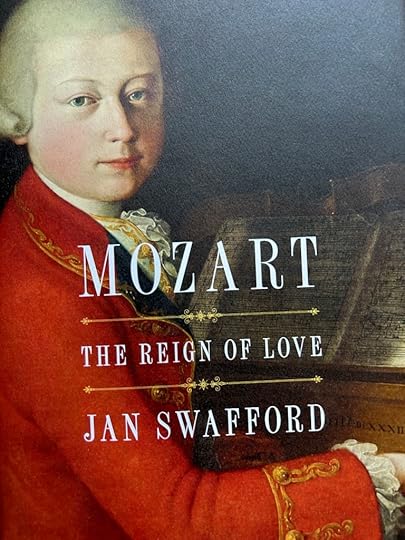
Many myths and legends have been woven around the life of Wolfgang Amadeus Mozart, the musical genius who burst upon the world stage as a five-year old prodigy in 1761, when his father, Leopold Mozart, toured the capitals of Europe with him and his sister, introducing them as ‘a miracle.’
The author of this account of Mozart’s life, Jan Swafford, is both a writer and a musician, giving him insights into aspects of Mozart’s work that go beyond those of most biographers. Thus, in addition to having read all the correspondence, diaries and contemporary accounts of Mozart’s life, including the letters written by his father during their various tours, as well as the letters written by Mozart himself, whether to his father, his wife or various other individuals, Jan Swafford has been able to analyse and discuss in depth all Mozart’s musical scores. The result is this long and detailed account of Mozart’s life and work, casting new light on the character of the man whose prodigious output came to an abrupt end with his untimely death at the age of 35 in 1791,
The book starts with an account of the scene in the Mozart household where Wolfgang’s sister, nine-year old Nannerl, is sitting at the family harpsichord, working on a piece of music her father, himself a musician and pedagogue, has given her to learn. Her little brother, four-year old Wolfgang, watches in fascination and when she has finished playing, he jumps up, sits at the keyboard and reproduces the notes his sister has been playing. The astonished father notes this on the page of music and goes on to make a record of other pieces of music little Wolfgang manages to master in short order. Leopold Mozart realised that his ‘miracle’ child could also become a paying proposition. With a resourcefulness unequalled ini the musical world, Leopold organised a tour of European capitals for his children at which they were feted and applauded wherever they went.
“I can compose as easily as a cow piddles,” young Wolfgang wrote to his sister at one point, and his ability to compose and improvise at the keyboardand quickly earned him a reputation throughout the musical world. Life on the road soon became second nature for the Mozart family, despite Leopold’s obligations to the ruling establishment in their home-town of Salzburg. Medicine was not very advanced at that time, consisting mainly of bloodletting, erroneous diagnoses and unsavoury concoctions purporting to be medicine, so that travelling exposed Wolfgang to various illnesses. After contracting a form of rheumatic fever as a child, he seems to have suffered from repeated bouts of it at various stages of his life, weakening him physically and stunting his growth. Nonetheless, his spirit remained undaunted and the drive to compose music, whether for private performance, chamber ensembles or larger orchestras remained at the forefront of his activities. Many of his keyboard concertos were written to be performed by him at concerts aimed at augmenting his income.
Commissions for operas were one of the prime sources of incomce for musicians who, like Wolfgang, were not employed on a regular basis by a royal court or ecclestiastical body. Thus, in 1767, aged only thirteem Wolfgang wrote his first opera, ‘Sebastien and Sebastienne,’ going on to write several others while still a teenager, using subjects and librettos provided by Italian writers such as Marco Cotellini, Metastasio and others.
In 1780, aged 24, Wolfgang conducted the first performance of his opera, ‘Idomeneo,’ written in the grand Italian style, and in 1782 he moved to Vienna, getting away from provincial Salzburg and his domineering father. He courted and married Constanze Weber, a singer whose sister Aloysia was a renowned soprano with whom Mozart had once been in love. At this point he wrote the Singspiel (German-language opera) ‘The Abduction from the Seraglio,’ according to a libretto by Johan Gottlieb Stephanie featuring the theme of Turkey and Turkish-style music which was popular at the time.
Throughout his life Mozart continually composed serenades, divertimentos, symphonies, concertos and church music at a rapid rate, tending to focus on his operas to an increasing extent. This trend accelerated after he first collaborated with librettist Lorenzo da Ponte, leading to his stellar operas ‘The Marriage of Figaro,’ (1786) followed by ‘Don Giovanni’ (1787) and ‘Cosi fan Tutti’ (1790). In addition, in the last year of his life, as well as various pieces, concertos and ensemble pieces, he composed another opera in the granr Italian style, ‘La Clemenza di Tito’ (1791). His last opera, the Singspiel, ‘The Magic Flute’ (1791), used the libretto of his friend and the manager of a theatre in Vienna, Schikaneder. In the last year of his life Mozart was working at an intense pace, working incessantly to produce one masterpiece after another, and although he was suffering from deteriorating health, he continued working to his very last breath.
Jan Swafford analyses and dissects the text and score of each opera in great detail, giving the reader fresh insights into the works, each one a masterpiece in itself. His analysis of key shifts is lost on this particular reader, I’m sorry to say, but Swafford’s understanding of the intricacies of the various plots as well as of the psychological and musical underpinnings of each character, vocal ensemble and orchestral accompaniment is unparalleled in my experience of any account of a composer’s life and work. Of course, the best way of reading the book would be to listen to each piece described, but this wasn’t possible in my case. The overriding aspects of Mozart’s life, according to Swafford were his joie de vivre, his deep affection for his wife, and his constant drive to compose music.
Swafford describes Mozart’s final illness and death, citing the tributes by his contemporaries to show the reader the effect this had on those around him. Schikaneder was found walking around crying, Joseph Haydn in London mourned that no one would be able to surpass Mozart for hundreds of years. Public memorials were held in Vienna, Prague, Kassel and Berlin. The largest memorial, attended by some four thousand people, was held in Prague, where Mozart was particularly beloved, and an account in the paper read: “There was profound silence during the ceremony, and a thousand tears flowed for our Mozart, whose heavenly harmonies so often moved and filled our hearts…”
The Requiem that Mozart had been commissioned to write by an unnamed visitor was finished by his pupil and amanuensis, Sussmayr, according to sketches and ideas that Mozart had outlined to him in his final illness and on his deathbed. Mozart’s wife, Constanze, outlived him by over fifty years. In addition to the Requiem, when he died Mozart had been working on a horn concerto, a violin sonata, a string trio and a string quartet, a Mass and various other pieces. In the last year of his life Mozart had earned relatively well and his prospects for the future were favourable. His widow managed to support herself at first by giving recitals of arias he had composed, and at a later stage by selling his manuscripts and correspondence, which left her a wealthy woman. She later remarried.
May 21, 2024
Saturday Night on the Bridge
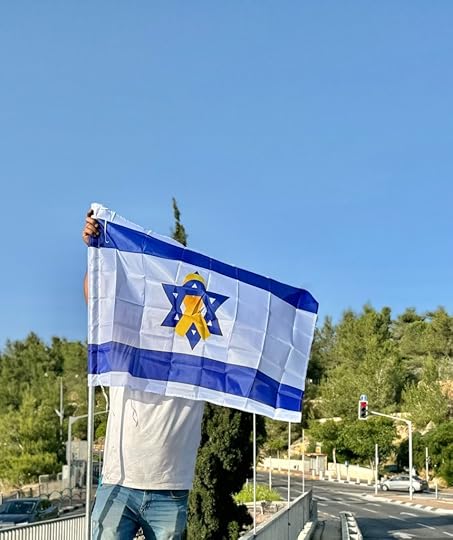
Every Saturday evening many thousands of Israelis leave home and go out to stand or march in protest in Tel Aviv, Jerusalem and towns and villages throughout Israel. They are demonstrating to protest their government’s mismanagement of the war in Gaza as well as to demand the return of the hostages captured by Hamas on 7th October and still held captive in Gaza.
In Mevasseret Zion, where I live, the weekly demonstration is held on the small Hemed bridge that abuts the Arab village of Abu Ghosh and spans the highway between Jerusalem and Tel Aviv. I arrived there early last Saturday as I had wanted to buy plants at the nearby nursery before it closed, and as I waited for other demonstrators to arrive I was able to witness the arrival of the Border Police unit deputed to maintain law and order at the demonstration. The young men and women arrived in several police vehicles which they placed at strategic points at either end of the bridge.
Then the demonstration organisers appeared in a van, brought out banners and flags, then set up barriers between the road and the pavement, enabling traffic to continue to flow. Soon other demonstrators appeared, and within a short space of time some three- or four-hundred people had gathered on both sides of the road spanning the bridge. The atmosphere was friendly, and in the crowd I recognized friends and neighbours as well as colleagues from my former place of work. Fortunately, there were no counter-demonstrators like those who have attacked demonstations in inother towns. After playing some Israeli songs over the loudspeaker and briefly addressing the crowd, one of the organisers read out the names of all the one hundred and thirty hostages and demanded their release. After each name the crowd shouted in unison: NOW!
The demonstration came to an end, at which point the police moved their vehicles out into the road, blocking it to traffic in both directions. The crowd then pushed the barriers aside and went to stand in the road. The signal was given and we all stood to attention and sang the national anthem, Hatikva, (Hope). The police then moved their vehicles back, the crowd dispersed and the traffic began to flow again.
Many demonstators had come in their cars, so there was quite a traffic jam back into the village as people tried to leave the area, but eventually everything flowed smoothly and life returned to its normal pace.
And so our ‘new normal’ continues in the most abnormal of situations, and there’s no knowing how and when it will all end. We can only hope that some kind of settlement can be reached, the hostages released and our previous way of life resumed.
May 10, 2024
A Family Without a Home
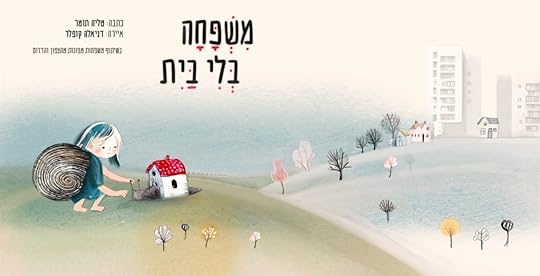
Along with being at war with Hamas in Gaza, Israel was attacked on its border in the north. In order to avoid civilian casualties Israel evacuated the population in the towns and villages in the south and the north of the country. Initially, people were accommodated in hotels in the centre of the country, with each family being allocated a room in a hotel, and this situation has persisted in the months since then. Thus, over two hundred thousand people have been forced to leave their home and live in unfamiliar and cramped conditions for a much longer period than was originally envisaged.
The two young women, Talya Tomer and Daniella Koffler, who produced the children’s book about parents called up for reserve duty have now produced another book, ‘A Family Without a Home,’ in order to help children who are now living far away from their friends and familiar surroundings to understand and come to terms with this new experience.
The charming illustrations and rhyming text in Hebrew give an account from a child’s viewpoint of what it is like to have to quickly pack up and leave your home under the protection of the IDF, and the experiences of becoming acquainted with the new surroundings, and the surprise, curiosity and even delight at the differences between their old, familiar home and the new environment of a hotel.
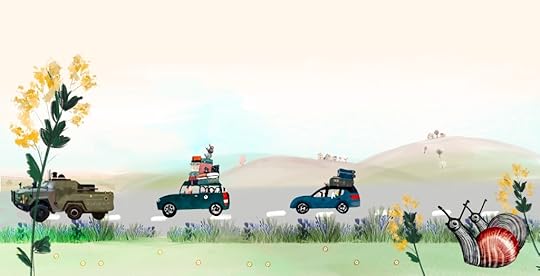
But once the novelty has worn off the children long for the familiar life they have left behind. They miss the food their parents used to prepare, the friends they used to play with and all the familiar frameworks with which they have grown up. One expecially touching page depicts the visit the family makes to their former home and how the little girl embraces and kisses the front door she once knew so well. The book concludes with the child’s acceptance of her mother’s explanation that one’s home is not necessarily a question of bricks and mortar but rather a place in one’s heart where one’s family and loved ones reside.
Like the previous book in the series this, too, was made possible by means of crowd funding and has been distributed gratis to all the children who have been obliged to leave their home.
May 1, 2024
Getting Away From It All
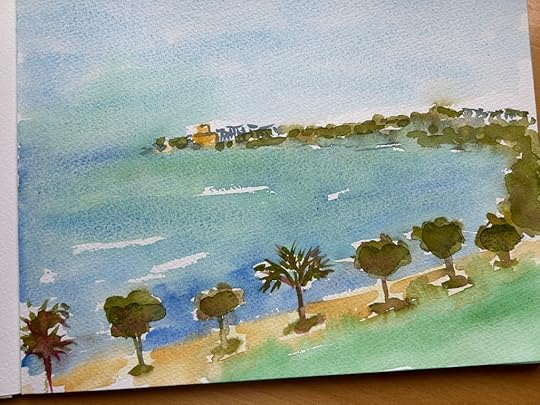
The only trouble is – you can’t get away from it all. Not if you’re Jewish. Not if you live in Israel. Not if you’re in any way connected to the world.
For the first time in my life I did not celebrate Passover in any shape or form. We did not have a Seder as we usually do because our children and grandchildren were with ‘the other side.’ We were not invited to anyone else’s Seder, and were not inclined to attach ourselves to any of those on offer in one form or another, whether for payment or as a charitable act. Although I grew up in an orthodox home in the UK but have ceased to subscribe to that aspect of my Jewishness, and my OH grew up in Israel, where the festivals are celebrated as a matter of course, we decided to take ourselves off to the neighbouring island of Cyprus for the eight days of the festival. I have no trouble breaking the rules, though my OH took along boxes of matza to avoid eating bread, but of course there was no question of getting food that was ‘kosher for Pesach,’ or kosher at all.
There wasn’t a single empty seat on the short flight from Israel to Cyprus, indicating that we were not alone in our desire to get away from the heavy atmosphere that descends on Israel each time there is a religious festival, and even more so since the fateful day last October, when yet another religious festival was the occasion for yet another violent assault on an unsuspecting and unprotected public. In the months since then the fate of those who were murdered, fell in battle or are still being held as hostages hangs like a heavy cloud over the daily life of everyone in Israel.
Our hotel on the beautiful seaside resort of Paphos was comfortable, the staff and the other people we encountered were friendly and the weather was fine. Altogether it was the perfect holiday for relaxing and enjoying the good things of life. But there was no getting away from the fact that just across the water daily life in Israel continued to be haunted by the spectre of what happened there just six months earlier as negotiations for a ceasefire and the release of the hostages continued. Even when the news is reported in Greek (though the TV in our room also showed one of the Israeli channels as well as the BBC), it’s impossible to avoid scenes of devastation, clips of pro-Palestinian demonstrations at universities across the USA or recognize the names of Israel’s prime minister and other politicians.
When one of the waiters in our hotel noticed that my OH was eating matza he started talking to us in Hebrew, and went on to insist that everyone in Cyprus loves Israelis, that they all speak Hebrew and that they are waiting eagerly for the return of tourists from Israel.
As we know, the Cypriots have their own problems, and the island is still divided (not amicably) between its Turkish and Greek population, with a militarised border between the two segments. The Turkish part in the north is still allied with Turkey and uses that country’s currency. The Greek segment is now in the European Union and uses the euro. The enmity towards Turkey, which sent troops to invade Cyprus in 1964, resulting in a conflict which ultimately caused the displacement of hundreds of thousands of Cypriots, might help to explain the affinity the Greek Cypriots feel towards Israel.
The return flight to Israel carried a planeload of tired but relaxed Israelis who had benefited from the brief respite from the tense atmosphere of their homeland by being in a country which has managed to surmount an adverse situation and create a solution which, while not perfect, enables them to continue to live in some semblance of peace. We can only hope that somehow, some day we will find ourselves in a similar situation.
April 18, 2024
The National Library and Me
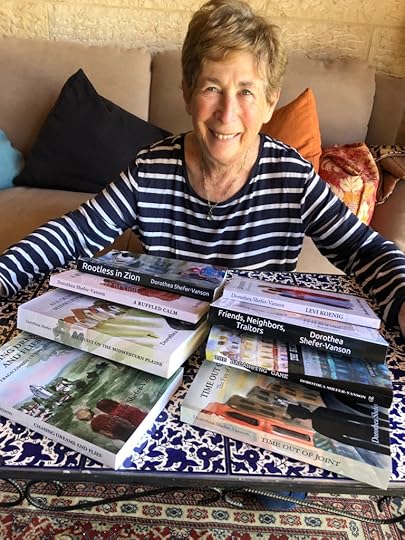
On a tour of the new building of Israel’s National Library a few weeks ago I learned that it is mandatory for at least one copy of every new book published to be deposited in the Library. The printed form regarding the depositing of the book or books bears the following text (originally in Hebrew, English translation by me) with space left for the titles of the book or books and the name of the author:
‘We are happy to confirm that the collections of the National Library have received the publications listed below:
‘The publications received by the Library are recorded in the catalogue of the National Library and the consolidated catalogue of libraries in Israel, and their copies are preserved for future generations. We thank you for submitting the copies and for your contribution to building the collection and preserving our culture. We hope that in the future you will also provide us with copies of your new publications when they appear.
‘You will soon receive confirmation by email confirming receipt of the copies.
‘With gratitude and respect,’
The Absorption and Ordering Team of the National Library.’
It all seemed to be designed to impress upon the provider of the books, in this case the author, i.e., myself, the weighty significance of having one’s books included in the Library’s collection and catalogue. So I decided to do my best to comply with this demand, which of course I should have done at the time my books were published, but omitted to do so, whether out of ignorance, indolence or sloppiness.
My first task was to locate and collect a copy of each of my books. In my basement stands the metal filing cabinet that was a fixture of the home in which I grew up in London and held various documents belonging to my late father. At some point, after it had been emptied of its contents, I loaded my books into its capacious drawers, so it wasn’t with too much difficulty that I extracted one copy of each book.
Much to my surprise, I found that I had written a total of eight books. Starting in 2014, with my first novel, ‘The Balancing Game,’ I had embarked on a writing blitz, producing a book a year till 2021. There was no room on the form I had been given by the Library for all my books, so I prepared a printed list. I loaded the books into one of the small carry-on cases I take when travelling abroad, and waited for a morning when both Yigal and I would be free to go to the Library. The physical task of reaching the library with the little case was too much for me to contemplate alone and unaided.
The morning when both Yigal and I were free came last week. We drove to the Library and even managed to find a place nearby to park our car. On entering the Library we and our suitcase were searched, but eventually we were able to take the lift to the floor where one submits one’s books. We were not alone, as the desk was manned by three librarians, and all of them were busy. Eventually our turn came. We unloaded our books onto the counter. They looked lovely there, the covers all being based on my own watercolour paintings. Unfazed, the librarian handed me an empty form and told me to start filling it out. I began to embark on the task, expecting to have to make an effort to get my books into the annals of posterity. However, when the librarian saw my printed list with all the relevant details he relented and told us that we could leave.
So at some point in the not-too-distant future, I hope, all my books can be found on the shelves and in the catalogue of Israel’s National Library. The list is appended herewith, and I think I am justified in feeling a sense of pride.
LIST OF BOOKS BY DOROTHEA SHEFER-VANSON
Dorothea Shefer-Vanson
Tel: 054-4745682
website: shefer-vanson.com
blog: https://fromdorothea.wordpress.com
P.o.B. 736
75 Kalanit St.
Mevasseret Zion 9070674
THE BALANCING GAME; A CHILD BETWEEN TWO WORLDS, A SOCIETY APPROACHING WARPublished by SPBRA; 2014
2.TIME OUT OF JOINT; THE FATE OF A FAMILY
published on Amazon; 2014
3.LEVI KOENIG; A CONTEMPORARY KING LEAR
published on Amazon; 2015
4. CHASING DREAMS AND FLIES; A TRAGICOMEDY OF LIFE IN FRANCE
published on Amazon; 2016
5. ALL QUIET ON THE MIDWESTERN PLAINS
published on Amazon; 2018
6. A RUFFLED CALM
published on Amazon; 2019
7. FRIENDS, NEIGHBOURS, TRAITORS
published on Amazon; 2020
8. ROOTLESS IN ZION
published on Amazon; 2021
;
April 14, 2024
The Way We Live

When I asked the person in charge of the trip to Eilat organized by the association of pensioners of my former place of work whether there would be some security or at least someone with a weapon on the bus he expressed surprise and answered in the negative, insisting that the roads were safe. Still, we went, having decided that we needed a change from our routine, and hoping for the best. In the event our journeys to and from Eilat were uneventful, although a missile fired by the Houthis did get through Israel’s defences while we were there. One evening we heard a muffled ‘boom’ as we were sitting in our hotel room. Luckily no damage was caused, but the consequences could have been dire. How and why our defences neither caught the missile nor set off any alarm in the town is a mystery. But there have been worse failures of Israel’s defences in the last few months.
Since the assault on Israel by Hamas terrorists on 7th October we in Israel have learned to live with a sense of vulnerability. Our confidence in the ability of our intelligence and surveillance systems has been severely shaken, and it seems unrealistic to rely on the current government for any practical resolution to our situation. Awareness of the plight of the hostages still in Hamas’ grip is another constant in our daily lives, and until that issue is resolved there can be no peace or confidence in our lives.
It is about ten years since I last visited Eilat, Israel’s answer to Bournemouth but with a better climate. In that time the town in the far south of the country has been cleaned up and beautified, with plentiful greenery in the form of trees and bushes as well as many colourful flower-beds and a constant attention to improving the facilities. The beaches are clean and welcoming, the hotels aesthetic and friendly with varying degrees of luxury, and the artistically-paved promenade seems to be undergoing an incessant process of improvement. In addition to its various attractions such as outings on boats, snorkeling and swimming with dolphins there is now an indoor skating rink and trips to interesting sites such as the impressive archaeological site of Timna as well as the ornithological observatory where many different kinds of migrating birds spend time on their way to and from Africa and northern Europe.
And so we try to stay optimistic and carry on as before as much as possible, but with the constant nagging awareness that the situation is probably going to go from bad to worse before there can be any improvement. The results of an opinion poll carried out by the Palestinian Center for Public Opinion and Research among Arab residents of Gaza and the West Bank (can the situation be that bad if it’s possible to conduct a statistically reliable opinion poll there?) show that support for Hamas and denial of the atrocities it committed is stronger than ever. The explanation for this provided by Dr. Halil Shkaki, the Director of the Center, is satisfaction that this has brought the Palestinian issue back into the international limelight. The question remains, however, to what extent this will help the Palestinian cause, as the idea of a Palestinian state alongside Israel is now regarded as an existential threat by many Israelis who once saw it as a viable option. After all, Gaza ruled by Hamas was in essence potentially the longed-for Palestinian state.
April 7, 2024
Wer alles Weiss hat keine ahnung (A Clever Person Doesn’t Know Anything)
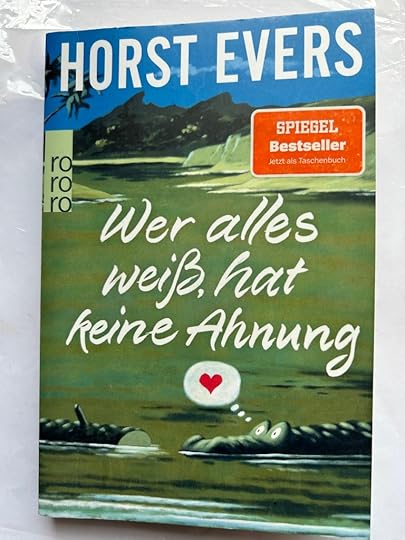
I summoned up all my courage and determination and decided to read this German book by Horst Evers, which had been recommended by my German teacher. The book consists of little anecdotes about the everyday life of the author, including mishaps, misunderstandings and misjudgments. To my un-Germanic eye, the pieces in the book read something like the blog posts that I myself write each week, but are written in a more humorous and personal tone. As far as I can tell, given my limited knowledge of German, the items are written in a way that aspires to being witty, or even ironic, poking fun at the author himself. Some of the pieces mention his immediate family (wife/partner, daughter) and the little incidents that srise from these relationships, while others describe his struggles with German officialdom and the effort to master the ‘benefits’ of contemporary technology.
Several pieces recount the author’s experiences in various occupations under the rubric, ‘My Life in Thirteen Occupations,’ at most of which he admits to failing. Thus, the first one was Assistant Agricultural Machinery Mechanic (naturally, I had to resort to Google Translate to help me decipher this and several other occupations). Since the author is a writer with a decidedly arts – as opposed to science – bent, it comes as no surprise to the reader to read of his dismal failure in this sphere, as was also the case, albeit for different reasons, in his brief career as a cook ,also known as ‘The Right Hand of God’. Almost all the pieces are written in a self-deprecating tone, so that the reader starts to feel almost guilty at finding them amusing.
One particularly entertaining piece describes a vacation rental where ‘Here Guests do the Cooking,’ and another, entitled ‘Cold Feet,’ gives a comical account of the roundabout way he discovered where he had left his winter shoes the previous year. One of the thirteen occupations in which he found himself was as a copywriter for an advertising agency, and as the book progresses he seems to find himself in increasingly appropriate occupations, ending up finally as a reader of manuscripts for a publisher, though not omitting to mention his stints as a Rock Star, Chicken Slaughterer and Express Delivery Person along the way. Learning about all these occupations certainly did a lot to expand my German vocabulary.
The last few pieces in the book describe how the author and his family endured the isolation of the Covid lockdown period, as well as the unexpected way in which he arrived at the title of the book – after a conversation with his daughter who remembered something he had told her that one of his teachers had once said, and which – of course – he couldn’t remember at all.
March 31, 2024
A Hidden Gem
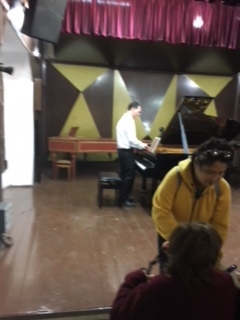
The series of chamber concerts with explanations organised by the Music Academy in Jerusalem is one of the hidden gems of the city’s music scene. The series, which is now in its twenty-fourth season, consists of a selection of music based on a theme, a composer, or a group of composers, and is performed primarily by teachers (and sometimes students too) of the Academy. We have been attending these monthly concerts for the last twenty years, and have almost always enjoyed them immensely. Unfortunately, attendance at the concerts is diminishing over time as the die-hard kernel of devotees is gradually being reduced (by natural causes).
When we first started attending the concerts they were held in the imposing Wise Auditorium on the Hebrew University’s Givat Ram campus. The musician who initiated, lectured and played at many of the concerts was Professor Assaf Zohar, who now teaches at the Buchman-Mehta School of Music in Tel Aviv. For a few years after that the concerts were held in the Music Academy itself but in recent years the venue has been the comfortable Rebecca Crown auditorium, which is part of the Jerusalem Theatre complex also known as the Jerusalem Center for the Performing Arts.
Some of the recent performances have focused on the subject of family ties. Thus, when we heard piano pieces composed by Fanny and Felix Mendelssohn it was not always easy to distinguish which piece had been written by whom, and the same applied to works by Robert and Clara Schumann. This was quite an eye-opener for me, and only goes to show that sexism has prevailed in music just as it has in society as a whole.
In recent years Dr. Ron Regev, the head of the Academy’s piano department, has taken over at the head of the concerts, injecting his own personal touch of brilliance to the programme. Apart from being a virtuoso pianist, Professor Regev is also an engaging and inspiring speaker, and to hear him talk about the music he and his colleagues are about to play is always enjoyable and uplifting.
The title of the current series of concerts, ‘Language and Style,’ provides ample scope for including a varied selection of music in each programme. The concert we attended last week was entitled ‘The Romantic Flute,’ and included pieces by French composer Cecile Chaminade, Bohuslav Martinu and Felix Mendelssohn for combinations of flute, cello and piano, allowing Dr. Regev and his colleagues to display the full gamut of their talents. The final piece of music they played was Mendelssohn’s beautiful trio for violin, cello and piano, opus 49, with the flute (admirably played by Professor Yossi Arnheim) substituting for the violin.
In his introductory remarks Dr. Regev said that this trio had been the subject of his doctoral dissertation, and that it was particularly close to his heart. He described how Mendelssohn had struggled when composing it, changing and amending it several times, until eventually settling reluctantly for the current version (which is exquisite). The programme notes distributed before the concert state that this dissertation gained the Richard Franz Prize for outstanding doctoral dissertation awarded by the Juilliard Conservatory in its centenary year, and also constituted the basis of the lecture and concert given by Dr. Regev at the Library of Congress in Washington.
It goes without saying that the performance of the Mendelssohn trio by Ron Regev, Yossi Arnheim and cellist Shmuel Magen gave every beautiful and brilliant note of this captivating piece of music its right and proper place, providing the audience with a musical experience of unparalleled excellence. Although the auditorium was not full, the audience gave the musicians well-deserved lengthy and enthusiastic applause.
March 24, 2024
To the Finland Station; a Study in the Writing and Acting of History
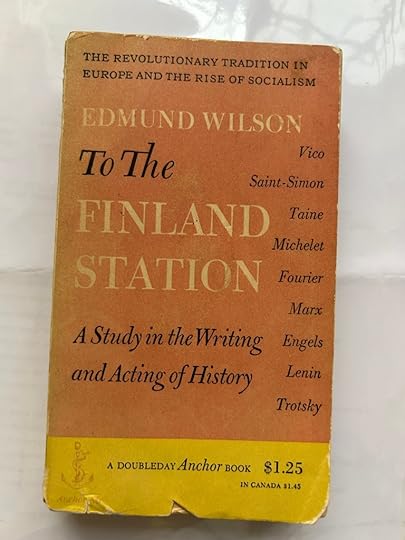
The journey to the Finland Station in the title of this study by Edmund Wilson is described only at the end of this book, and refers to the train in which exiled socialists Lenin and Trotsky together with other socialists travelled from Sweden to Saint Petersburg in Russia, thus triggering the Russian Revolution of October 1918. But there were predecessors to their Marxist form of socialism, and it is these that Edmund Wilson describes in the first half of his book.
Although the French Revolution of 1789 set off the process of social reform in Europe, Edmund Wilson starts his analysis of the progression towards socialism in 1824, when a young French professor of philosophy, Jules Michelet, came across the writings of the sixteenth century native of Milan, Giovannni Vico, who claimed that the development of human society was an organic man-made process Wilson traces the way ideas about society have developed, giving rise to the emergence of socialist principles over time.
In the eighttenth and nineteenth centuries thinkers about the nature of society, such as Lassalle, Saint Simon, Fourier and Anatole France in France, Robert Owen in England and America and Bernard Shaw and Beatrice and Sydney Webb in England, wrote and acted to advance the principles of a more equitable distribution of resources throughout society. Thus, Robert Owen set up a society based on his idea of utopian socialism (‘New Harmony’ in Indiana, USA), while the Webbs gathered statistics and sought to promote legislation aimed at providing equal educational opportunities to all segments of society.
The second half of this book deals with the personal lives, thinking, writiing and activities first of Karl Marx and Friedrich Engels, and then of Vladimir Ulyanov (Lenin) and Lev Davydovich Bronstein (Trotsky). Wilson describes the youth, background and peronsal life of each and every one of these four main protagonists in the evolution of socialism, bringing them to life and enabling the reader to see how the world they experienced, the books they read and the life they led caused them to develop their ideas about society and the distribution of resources.
Thus, through the correspondence between Karl Marx, living in impoverished exile in London, and Friedrich Engels, his friend and collaborator living in Manchester, we gain a better understanding of the nature of their relationship and work. We are able to see the frequent pleas of Marx, a family man, for financial aid. from Engels. The two had met in Germany and the latter had been sent to Manchester by his father to work in his textile company. This constituted the basis of their collaboration in writing ‘Capital,’ the ‘Communist Manifest’ and other seminal works outlining their theories about class conflict, society and the distribution of resources. Engels was able to supply Marx with a large part of the statistical data on the basis of which Marx developed his ideas about the economic basis of society and wealth. Both Marx and Engels were unable to remain in Germany because of their political agitation against the government. After spending some time in various European cities, Marx moved to London, where he remained from 1850 to his death in 1883 aged 64. Engels outlived him by several years in which he managed to complete the writing and publication of their seminal work ‘Capital.’
In describing the life and ideas of Lenin and Trotsky, Wilson shows us their human side and family origins. Both of them had fallen foul of the Russians authorities by virtue of their opposition to the autocratic Tsarist regime and had been imprisoned or sent to Siberia at various times. At a time (the late nineteenth and early twentieth centuries) when the revolutionary mvvement was gaining strength in Russia despite being oppressed and attacked by the regime, they managed to gain a growing following among both the bourgeoisie and the proletariat, enlisting the support of the working class and large parts of the army, which was dissatisfied with its lack-lustre involvement in the First World War. The dissatisfaction of the growing industrial working class also served as a source of support for the Bolshevik movement.
It is worth noting that both Marx and Trotsky came from assimilated Jewish families, and received a secular education. Nonetheless, it is possible that the ideas they absorbed in their early upbringing may have set them off on the path that led toward social reform, and – eventually — revolution. The later development of what was called socialism in Russia took a course toward an extremism and even despotism that was far removed from the original idea of alleviating the poverty of the toiling masses and eliminating discrepancies of wealth and prosperity. Nonetheless, the central idea of more equitable distribution of resources has taken hold even in non-socialist countries, with greater equality in the availability of health, education, housing to most sections of the population.
March 14, 2024
Sunday Morning, 6 a.m.

(My translation of a poem by Giora Fisher)
When I bent down to pick Israel up from the mud
The driver of the bread delivery truck said
“Look at that beautiful rainbow in the sky.”
That brief poem has haunted me ever since I came across it in the literary section of the Hebrew newspaper I read. Those lines sum up in the most expressive way what has happened – and is still happening – to us here in Israel.
We have just endured a catastrophic episode in our long Jewish history, in which catastrophes have tended to materialize from time to time. But nothing on the scale of what happened on October the seventh has ever happened here in Israel before. The incursion into our country of thousands of armed marauders bent on murder, destruction, pillage and rape has left many of us traumatized. After all, Israel was established in order to prevent that sort of thing happening to our people ever again. As a sovereign, internationally-recognised national entity we are able to raise an army to defend our borders, and take whatever measures are required to achieve our security, provided we remain within the bounds of international law.
Even as we remain shaken by the events of a few months ago we try to continue to keep hope in our hearts, to stay positive, permit ourselves to take pleasure in the good things of life. Despite the death and destruction wreaked in our southern communities Israel is still a vibrant country with a resilient population that has rallied to the banner of defiance in the face of tragedy. We won’t allow ourselves to be trampled into the mud. We continue to demand the destruction of those who seek to inflict harm on us, taking measures that are considered ‘disproportionate’ in some quarters and have undoubtedly had unfortunate results for the civilian population of Gaza. But it can be legitimately argued that the final objective of attaining security on Israel’s borders is a cause worth fighting for. For the 180,000 Israelis evacuated from their homes on the borders that is a worthy cause, as it is for the families of the 140 hostages still held in captivity in Gaza. For them – and all residents of Israel — there can be no greater objective than attaining their release.
But we must also remember to turn our attention to that ‘rainbow in the sky.’ For those of us who are still living in our homes, are not in immediate range of the rockets, don’t have relatives who are hostages, are not directly affected by the security situation, life continues much as before, with its customary ups and downs. We have enough food to eat, a roof over our head, hot water for a shower, a kettle to provide us with a cup of coffee or tea at the appropriate time and the knowledge that our loved ones are within reach, whether by phone, car or even a brief walk.
We must allow ourselves to continue enjoying the good things of life – the warmth of the afternoon sun, the sight of the sea, the beauty of nature in our gardens, balconies or nearby open space. For me, it is the ability to hear classical music on the radio, attend a concert, cook a meal for my family or enjoy a piece of chocolate – without having to feel guilty or ashamed. Life goes on, and as a nation that has endured many tragedies, culminating in the Holocaust that is still fresh in many people’s memory, we know that that is true. I take the example of my parents’ generation as my lodestar. They have endured. My parents fled Nazi Germany as young adults and were lucky to be able to move to England as refugees. Both of them lost their parents and other relatives and friends in the Shoah, but my sisters and I grew up in a home that was full of laughter and was not overshadowed by painful memories. We must make an effort, just as my parents did, not to let the past dominate the present. We must focus our attention on the beautiful rainbow and not on the mud at our feet.
שש בבוקר – גיורא פישר
כשהתכופפתי להרים מהבוץ את ישראל
היום ליד הצרכניה במושב,
אמר לי הנהג שפרק את הלחם:
“תראה איזו קשת יפה בשמים.”

